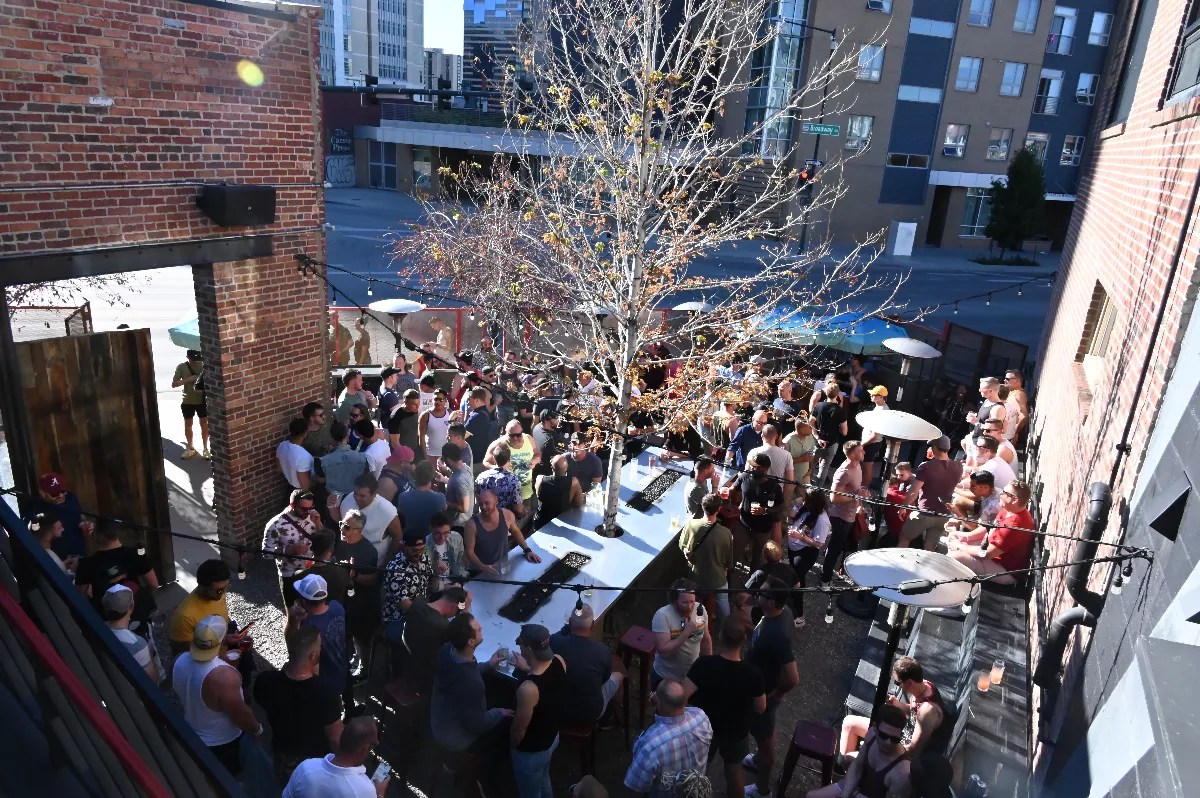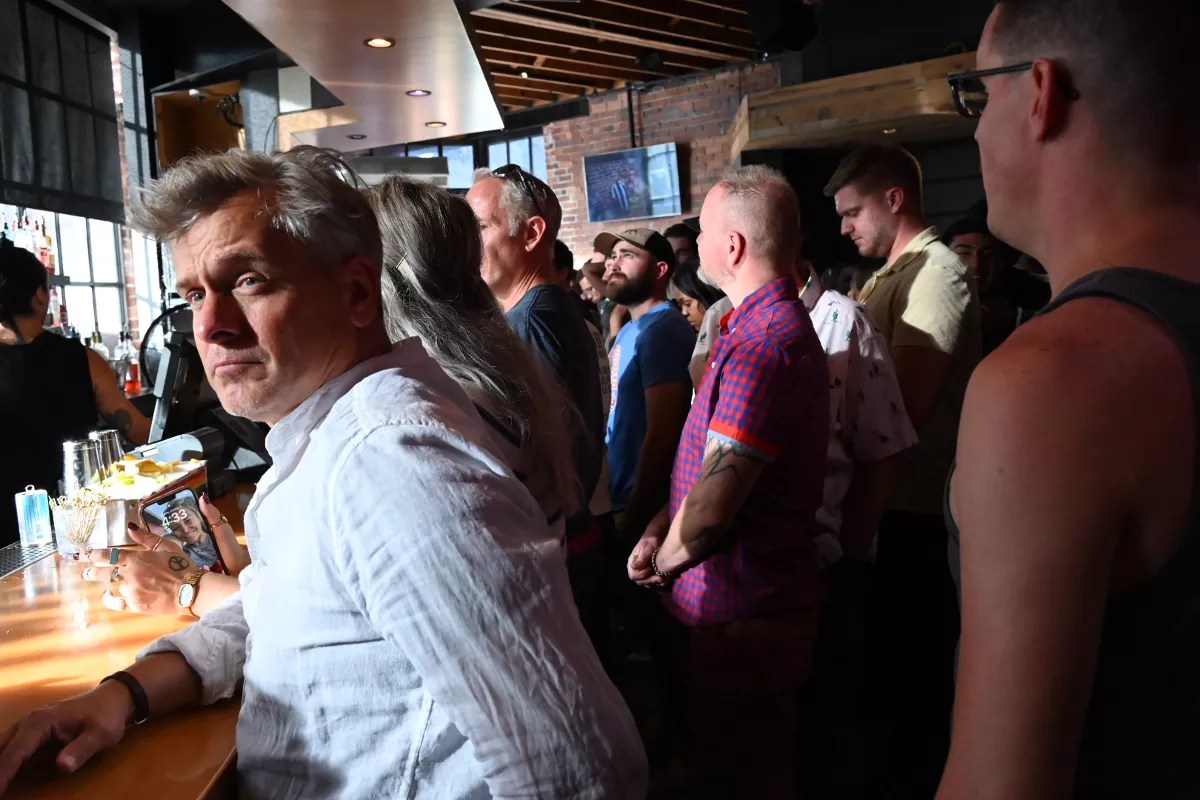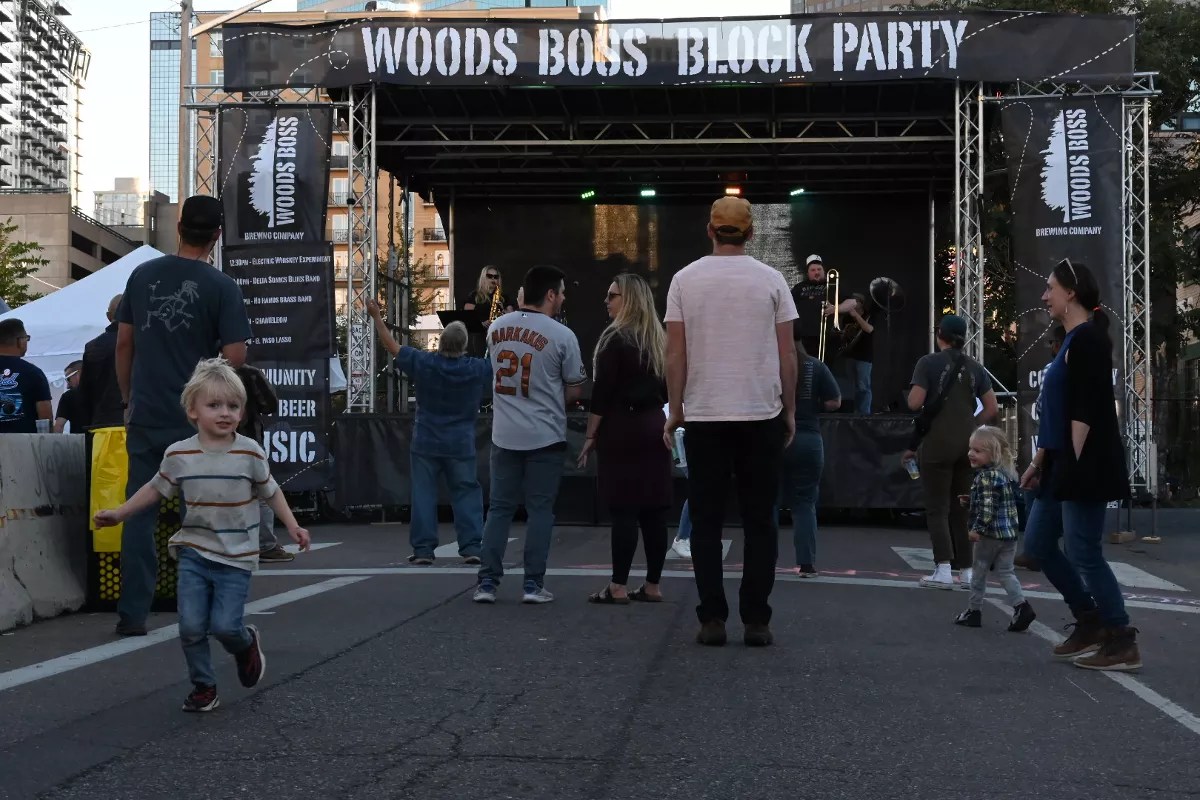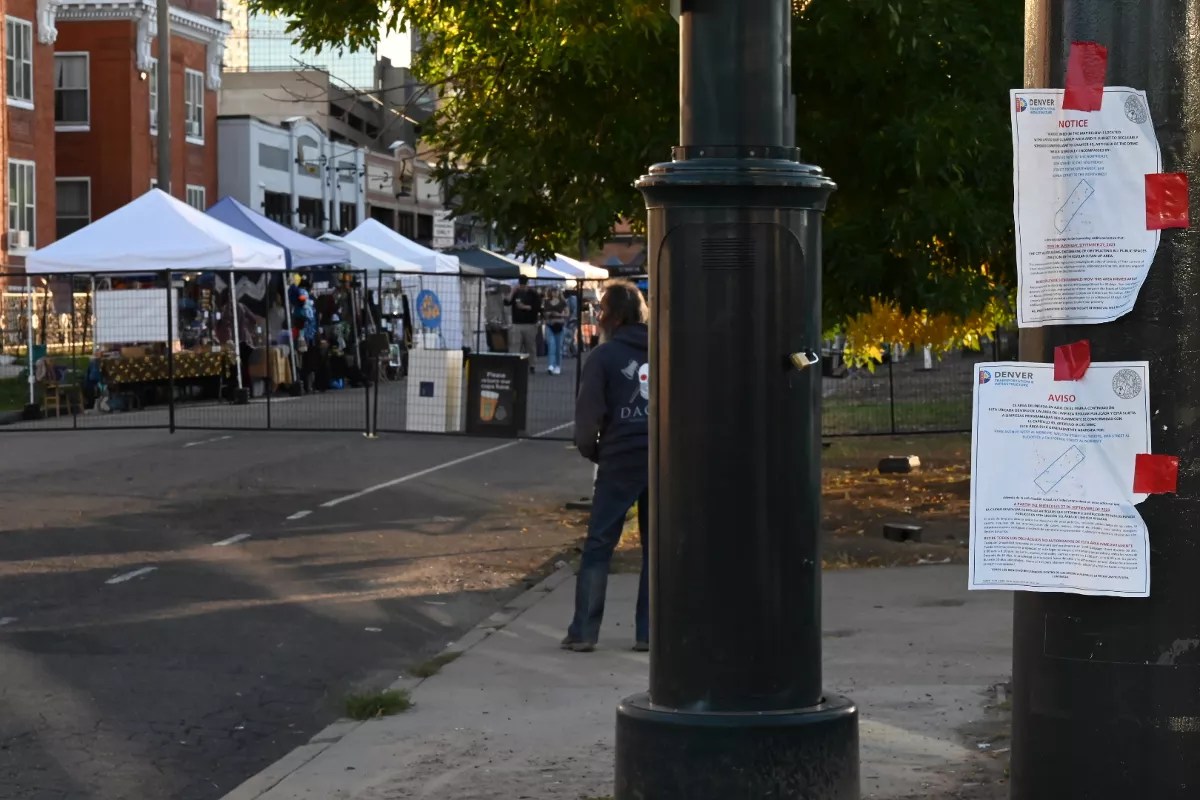
Bennito L. Kelty

Audio By Carbonatix
It’s been a tough year for downtown Denver businesses like Woods Boss Brewing Company and the Triangle Bar, which are located about a block away from each other. Both have owners who claim that revenues have tanked because of nearby homeless encampments.
But it certainly didn’t look that way over the weekend.
Woods Boss, a brewery and bar at 2210 California Street, held its annual block party on Saturday, October 7, and people flocked to the Triangle, at 2036 Broadway, on Sunday, October 8, for its “Farewell Beer Bust” after the owners decided to close “indefinitely” last week. Both events went off without a hitch, which warrants the question: Are the homeless encampments really the issue?
Patrons who spoke to Westword on Sunday scoffed at that notion, saying it’s a “bullshit excuse.”
“It’s kind of a cop-out,” said Triangle frequenter Paul Anderson. “Yeah, [homelessness] is an issue, but it’s a cop-out.”
Phil Thomas, another longtime patron, said: “We didn’t come that often, and that was never a deciding factor. It was an issue to come and deal with here; it’s not like they don’t exist. But we go to places on Colfax all the time, and it never bothers us there, either.”
Anderson told Westword he used to go to the original Triangle Bar that opened in the 1970s, and although he liked the new version that opened in 2017, it just didn’t have the same vibe – but Denver’s homelessness crisis has nothing to do with it, he insisted.
“The party disappeared,” Anderson asserted. “There’s not a lot of reason to come down here anymore.”
According to patrons and even some of the owners themselves, the reason downtown businesses like the Triangle Bar are declining and having to close up shop also has a lot to do with the city’s after-work and nightlife scene diminishing after the COVID-19 pandemic.
“I don’t want you to take away from this conversation that the homeless encampments are ruining the area. That’s not the case entirely,” said Woods Boss co-owner Chad Moore during the Saturday block party. “That is a significant impact to this area and what people’s ongoing perceptions are. There’s also the impacts of people not coming back to their workspace downtown.”

A long line formed at the Triangle Bar during its “Farewell Beer Bust” before the venue closes because of homeless encampments hurting revenue.
Bennito L. Kelty
In Moore’s eyes, “Denver is suffering significantly” from the homelessness situation. However, he admits that his business is “not doing well” to begin with, and that the encampments just make things worse.
“Restaurants, bars and retail, their problems are huge, because there’s a contingent of folks who aren’t coming downtown to come to work,” he said. “When there are homeless encampments within a block radius of this building, our numbers drop overnight.”
It would have been hard for first-timers to know that business was suffering this past weekend as hundreds of people packed the Triangle for its goodbye bash and the area outside Woods Boss for the block party.
Triangle co-owner Scott Coors had announced on October 5 that he was closing the iconic LGBTQ+ venue immediately and “indefinitely” after a survey of customers found that homeless encampments were causing residents to stay away. The results came in while the Triangle was also suffering from low revenues.
After closing in the late 2000s, several owners resurrected the Triangle Bar in 2017 and had success in the first few years. But since COVID, the bar hasn’t been able to recover, and revenues have trended downward much faster this year as more homeless encampments have sprung up around the block, Coors says.
In response to critics who believe he’s using the homeless crisis as a scapegoat, Coors says that he stands behind the survey his management team conducted and insists that nearby encampments are to blame, saying safety is the bar’s top concern.
“The encampments are completely out of control,” Coors says. “Our customers told us one of the main reasons why they aren’t coming any more is concerns over walking through the encampments.”
While it would’ve been hard to notice a decline in business on Sunday, Coors also points to the fact that a city sweep did just take place in the area two weeks earlier. Both the Triangle and the Woods Boss events went on for several hours.
At any given moment during the Woods Boss party, about 150 people could be seen inside the gates dancing to live rock, perusing merchandise under tents, buying tacos from a food truck or sitting inside Woods Boss and the neighboring businesses, laughing with friends. Triangle Bar hosted hundreds of patrons, as well.

Hundreds of people attended the Woods Boss 2023 block party to enjoy live music and good beer, and few were bothered by the problems of homelessness that impacted the businesses nearby.
Bennito L. Kelty
“It’s going great,” Coors said during the bash. “A lot of people showed up, and that’s great.”
Coors hasn’t been alone in his assessment of the downtown area and his business: Other guests told Westword over the weekend that they believed homeless encampments were drastically affecting things. Tyler Noble, a longtime patron, pointed out how there were even tents sent across the street from the Triangle as the party was going on.
“I have not been down here in a long time,” Noble said. “I’m understanding and compassionate about our homeless problem. But this is the other side of the real impact. It’s impacting our downtown and our business.”
Bruce Ferguson, who used to come once or twice a week to the Triangle Bar, said he stopped after the pandemic because he became more concerned with homelessness and safety. “I parked across the street, and I parked next to tents, and they go, ‘Hey!’ I used to park in a pay lot, and people would look into my car,” he told Westword. “I don’t need a problem when I come out. I don’t want to engage with potential violence.”
Coors hasn’t been the only business owner in the area that has complained and tried to urge the city to come up with solutions. He’s teamed up with Danny Newman from the Mercury Cafe, Mark Berzins from the British Bulldog and the owners of Woods Boss, among others.
Moore and fellow Woods Boss owner Jordan Fink have been throwing annual parties on the 2200 block of California Street since the business first opened in 2017. Coors, Fink and Moore all acknowledge that the sweep that happened in their area on September 27 was a welcome relief. Fink, however, admits that it also created “conflicted feelings” for himself and Moore.
“We’re humans, and we recognize that they are humans,” he said Saturday. “But at the same time, there is the aspect of ‘Thank God.’ There’s been a firewall around us for two months, and it’s significantly impacted our business, safety.”
According to Moore, whenever homeless individuals “set up shop on 22nd, California, Stout, any visual area here, our sales plummet.” Fink adds that the hit can be as sharp as “50 percent drops” in sales when that happens.
While guests at the Woods Boss block party were aware that encampments are an issue in the area, several said they had “good” or “fantastic” experiences on Saturday. “It’s nice,” said Kyle Freeman. “I like that it’s in October now – it used to be before the Great American Beer Festival, in the summer. The weather’s nice; I’m enjoying it.” Freeman, who also works in the area, acknowledged, “Homelessness is an issue around here, and I think people would like to ignore it. But you have to pay attention to it to know what’s going on in your city.”
Madison Francis, who was also at the Woods Boss block party, told Westword, “Homelessness is an issue, and it’s kind of dystopian to have these high-rises right across the street. I’m definitely sympathetic and in full support of finding them proper housing,” adding, “So far, my night has been fantastic, absolutely. That hasn’t been an issue tonight.”
When Fink and Moore threw their first block party, back in 2017, they highlighted the Colorado Coalition for the Homeless as the charity that was getting proceeds from the event. Likewise Coors says that he’s given “generously” to groups that support the homeless in Denver.
“Those numbers that we get to donate back to the community are dropping because we’re just trying to stay alive,” Moore said. “That’s frustrating.”

Outside the Woods Boss block party, a homeless man stood looking on while drinking alcohol, and a nearby lamppost shows that the block is a permanently posted cleanup area.
Bennito L. Kelty
Moore and Fink mentioned they had to double their closing staff to make sure no one was alone at night after some complained of being threatened by homeless people in the area; cars have also allegedly been broken into, and a storefront window was smashed by a rock.
“I wouldn’t let my wife park across the street” from Woods Boss when there were encampments, said Eisler, one of Saturday’s guests and a close friend of Fink and Moore’s, “I didn’t want her to go over there, because the homeless will harass you and then I heard they can get violent. So I only let her come here with me.”
Eisler, who has been working in an office near Union Station on Wewatta Street, told Westword that during the past few years, homeless encampments migrated from where he works to the area near Woods Boss and the Triangle.
Fink talked about how there was “a six-block wall of homeless creating a physical barrier for people in the downtown area that used to walk over to us all the time.” For a while, he said, “there was tons of traffic, and then we saw that take a hard dive.”
“To be frank, if a homeless encampment set up shop around these blocks again and sat there for over a month, we would be on the cusp,” Moore charged. “I don’t know if we would make it.”
According to Fink, area business owners sat down with a lawyer last week to consider suing the City of Denver for negligence for not enforcing its codes and letting businesses take the hit. “The issue is that there are certain neighborhoods where it certainly seems like the city has less concern about moving folks quickly, this being one of the neighborhoods where it doesn’t seem to be high on their priority list,” he said. “We’re expendable.”
The block in front of Woods Boss is part of a permanent posted cleanup area, which means that the city is supposed to regularly clear the area of encampments. For Fink and Moore, what they want to see most is cooperation between businesses, the City of Denver and the homeless.
“We need to figure out ways to generate the positive buzz that’s out there,” Moore suggested. “Go talk to any one of the customers who come here frequently, and they’ll tell you it’s a great place. If we can’t all work together, then it’s not going to work. We have to work together and figure it out. We can’t just shut out and say, ‘The area’s too tough, we’re not going to do a block party.’
“That’s why we’re throwing a block party,” Fink concluded. “To say, ‘Hey! We’re still here!'”